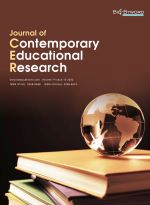Abstract
One of the major problems in the education sector is the reading skills of learners. Students enrolled in the Alternative Learning System (ALS) also experienced this scenario due to several circumstances. This study focused on the improvement of reading comprehension skills of ALS learners by means of project RICE (Reading Intervention and Comprehension Enhancement) as well as the issues and challenges. A quasi-experimental design was utilized in this study which was participated by 54 learners, composed of 27 learners under the experimental group and 27 under the control group. The result revealed that the learners in the experimental group changed from frustration level to instructional level after the implementation of project RICE while the learners in the control group changed from instructional level to independent level, thereby signifying a significant difference and the effectiveness of the project. Additionally, issues with time and resources were often encountered by the learners.
References
Study International Staff, 2019, PISA 2018 Results Show That Reading Skills Must Be Improved Worldwide, Study International, https://www.studyinternational.com/news/pisa-2018-reading-skills-improve-worldwide/
Galvez D, 2019, Poor PISA Scores A Wake-Up Call for PH Education System – DepEd Chief, INQUIRER.net, December 10, 2019, https://newsinfo.inquirer.net/1199952/fwd-briones-low-ph-pisa-results-a-wake-up-call
Snow CE, Kim JS, 2018, Reading Comprehension and Reading Skills. Annual Review of Psychology, 2018(69): 635–661.
Chavez MBB, Tadena LQ, 2021, Alternative Learning System in Time of COVID-19 Pandemic: Philippine Context. 14th La Salle Univ. Arts Congr, 2021(5).
Ocampo DM, 2021, Functional Literacy of Alternative Learning System (ALS) Learners: Basis for Sustainable Extension Activity Development. Online Submission, 5(2): 359–368.
Bowers JS, Bowers PN, 2017, Beyond Phonics: The Case for Teaching Children the Logic of the English Spelling System. Educational Psychologist, 52(2): 124–141.
Treiman R, 2017, Learning to Spell: Phonology and Beyond. Cognitive Neuropsychology, 34(3–4): 83–93.
Feruzi SM, 2021, Development of Reading Fluency from the Perspective of Automaticity Theory. International Journal of English Language Studies, 3(9): 23–27.
Afzal N, 2019, A Study on Vocabulary-Learning Problems Encountered by BA English Majors at the University Level of Education. Arab World English Journal (AWEJ), 10(3): 81–98. https://dx.doi.org/10.24093/awej/vol10no3.6
Cornoldi C, Oakhill JV (Eds.), 2013, Reading Comprehension Difficulties: Processes and Intervention, Routledge,London.
Labarrete RA, 2019, Reading Comprehension Level and Study Skills Competence of the Alternative Learning System (ALS) Clientele. PUPIL: International Journal of Teaching, Education and Learning, 3(1): 220–229. https://doi.org/10.20319/pijtel.2019.31.220229
Maramag M, 2022, Oral Reading Difficulties and Reading Behaviors of Alternative Learning System (ALS) Learners. International Journal of Arts, Sciences and Education, 3(2 June Issue): 102–120.
Badriyah B, Rahmawati E, 2020, Students’ Problems of Reading Comprehension During Online Learning in The Period of Covid-19 Pandemic. Proceedings of the 2nd International Conference on English Language Education (ICONELE) 2020.
Hussain M, Hussain N, Kousar M, 2022, Role of Pakistan Reading Project (PRP) in Promoting Urdu Reading Skill at Primary Level in Azad Jammu and Kashmir. International Research Journal of Education and Innovation, 3(1): 226–238.
Maciejewski ML, 2020, Quasi-Experimental Design. Biostatistics & Epidemiology, 4(1): 38–47.
Acharya AS, Prakash A, Saxena P, et al., 2013, Sampling: Why and How of It. Indian Journal of Medical Specialties,4(2): 330–333.
Bhandari P, 2022, Ethical Considerations in Research | Types & Examples, Scribbr, https://www.scribbr.com/methodology/research-ethics/
